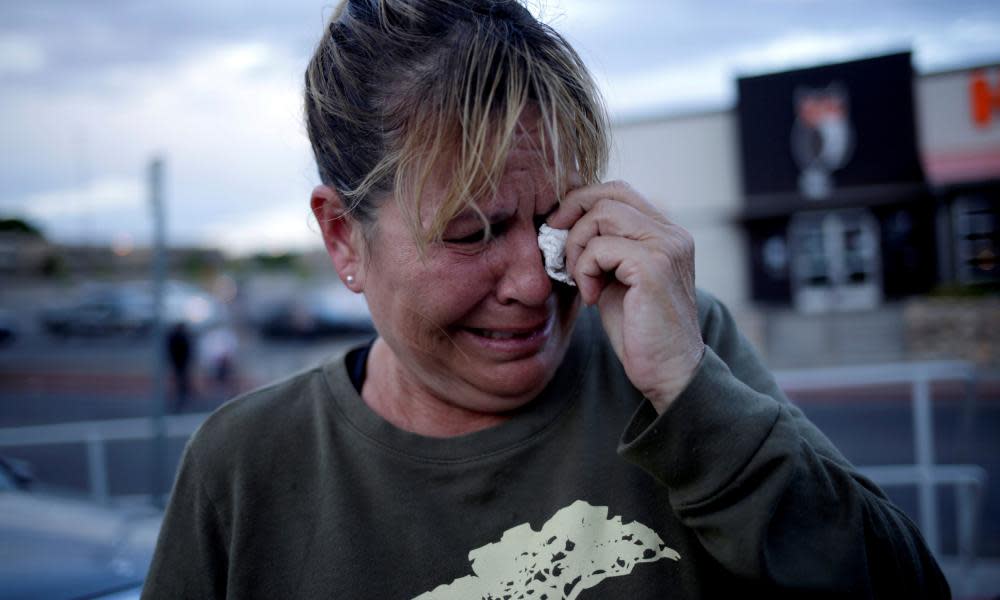Trump promised to end 'American carnage'. He has woefully failed

“Summertime and the livin’ is easy” are the opening lyrics of George Gershwin’s 1935 opera, Porgy and Bess. But not in America in 2019.
Not when you go to bed on Saturday night mourning the victims of a massacre in a Walmart in the border city of El Paso. Not when you wake on Sunday morning to learn of mass murder in the seemingly safe downtown streets of Dayton, Ohio.
In his 2017 inaugural address, Donald Trump railed against “crime and gangs and drugs that have stolen too many lives” in the inner cities. Then Trump declared, in words that now echo with bitter irony, “This American carnage stops right here and stops right now.”
There is no way to know with absolute certainty how much of the current wave of “American carnage” is directly due to Trump’s own words and his embrace of white nationalist themes. But even the Trump squad of gleeful apologists at Fox News would find it hard to argue that the president has lived up to his inaugural claim, “The oath of office I take today is an oath of allegiance to all Americans.”
Teddy Roosevelt coined the phrase “bully pulpit” to describe the moral authority of a president speaking from the White House. But unlike any other president, Trump has used his White House perch as a pulpit for bullies.
With each moment of national tragedy as Trump stands on the sidelines smirking, George W Bush’s pilgrimage to an Islamic Center in Washington six days after the 9/11 attacks shimmers in memory. This is what a president does to unite America and to remind his fellow citizens of the values of tolerance embedded in the Constitution and the nation’s history.
Ever since the federal assault weapons ban expired in 2004, advocates for gun control have been in retreat. The result of these 15 years of frustration – despite mass murders in elementary schools, churches, synagogues and shopping malls – has been an understandable and passionate belief in legislative panaceas.
Without a doubt, universal background checks, bans on the sale of lethal military-style weapons and other reforms would over time reduce deaths from gun violence. And the lockstep opposition of Republicans in Congress to even the most tepid proposals remains shameful.
But (and this is a “but” offered with a sigh) there are already roughly 400 million guns floating around America. And new legal restrictions on sales and re-sales would, alas, do little to provide protection from weapons that are already available to the mentally unstable and domestic terrorists.
Maybe the ultimate remedy over the next few decades would be a national movement to repeal the Second Amendment. Or a Supreme Court that would reverse the 2008 Heller decision that rejected the liberal argument that the Second Amendment refers to citizen militias rather than private home arsenals.
Yet even after this sad-eyed weekend, there are reasons for hope. Tipping points exist in political life, even in a gun-saturated land like America. As the late economist Herbert Stein memorably declared, “If something cannot go on forever, it will stop.”
The National Rifle Association – which for decades has fueled Republican scorched-earth opposition to any gun legislation – is in shambles. There have been a series of attempted coups against NRA president Wayne LaPierre amid charges that he has treated the organization as his personal piggy bank. What is undeniable is that the NRA is nearly broke, spending only $9.5m on the 2018 elections.
With affluent suburbs turning Democratic blue in their disgust with Trump, even the most cynical Republican strategists may be wondering about the lasting benefits of an alliance with pro-gun zealots. If the NRA can no longer provide campaign cash and constant carnage makes parents fear for their children, then Republicans may endorse some gun-safety measures for sheer political survival.
But the unavoidable truth is that gun violence is not a problem (like, say, the absence of health insurance coverage) that can be eliminated with one sweeping piece of legislation. The constraints of the Second Amendment and the existence of more guns than people in this violence-prone land mean that there inevitably will be future weekends when we mourn the senseless deaths from gun violence.
The last lines of Summertime are, “There’s a’nothing can harm you/with daddy and mama standing by.” If only that were true in America in the summer of 2019.

